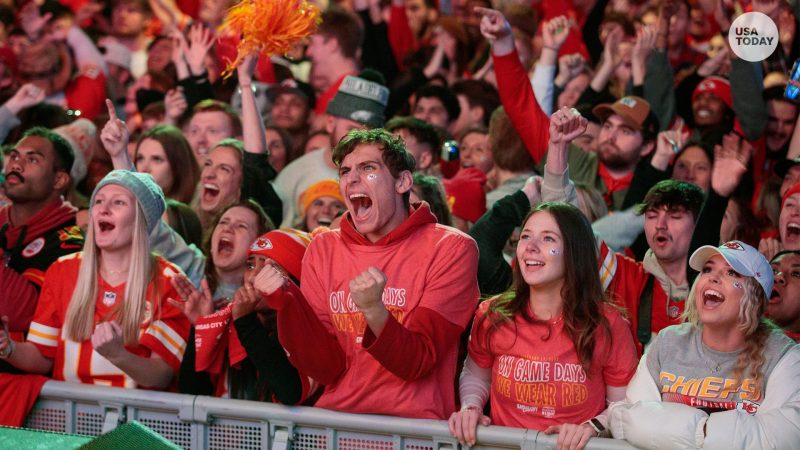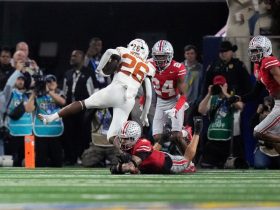The hype continues to build for Super Bowl Sunday and the big game between the Kansas City Chiefs and the San Francisco 49ers. Would it be even more fun if the day after the big game was a day off?
This isn’t a new concept. The idea of the Monday after the Super Bowl becoming a national holiday has been around for a while, but it hasn’t gathered enough momentum to advance. This year, ice cream treat maker Drumstick is promoting a petition to make post-Super Bowl Monday a national holiday.
Since 2017, Change.org has hosted more than two dozen petitions asking Congress, the president or the NFL to make the Monday after the Super Bowl a national holiday. One suggests moving Presidents Day to the day after the Super Bowl and others suggest no school the day after the game. Some schools have canceled classes the day after the Super Bowl when a local NFL team was involved.
Super Bowl Monday already an unofficial holiday
Since none of these petitions have paid off, many just unilaterally make the Monday after the Super Bowl a holiday. An estimated 16.1 million employees across the U.S. plan to miss work Monday, Feb. 12, the day after Super Bowl 58 is played, according to a survey of 1,192 Americans, conducted Jan. 10-12, 2024 by The Harris Poll for The Workforce Institute at UKG.
SUPER BOWL CENTRAL: Latest Super Bowl 58 news, stats, odds, matchups and more.
The expected absences – ‘Super Bowl flu’ as the workplace management company calls it – are down from last year when 18.8 million employees said they planned to miss work on Monday after the Super Bowl, according to UKG. And in more good news for managers, an estimated 10 million workers have already requested the day off.
As many as 14.5 million employed U.S. adults have called in sick to work when they weren’t actually sick on the Monday after the Super Bowl, the survey found. An estimated 28% of employees say they will be less productive on that day. In the past, outplacement company Challenger, Gray & Christmas has estimated lost productivity from absent and distracted workers on Super Bowl Monday at $6.5 billion.
More than one-third (37%) of employees said the day after the Super Bowl should be a national holiday. ‘It’s a national cultural phenomenon, for sure, and it’s a day when people are with family and friends and neighbors and groups (and) in bars, for hours. And on the East Coast, in particular, the game ends really late,’ said Chris Todd, CEO if UKG.
So the next day, ‘everyone treats it like a holiday, even though it’s not a holiday,’ he said.
Good managers will treat the Monday after the Super Bowl ‘like a holiday, even if it’s not a holiday,’ and begin discussing ‘the impact that’s going to have’ on the workplace ahead of time, Todd said.
Some offices may start work a few hours late or allow some to take the day off. ‘We actually think if you manage this well, this is an opportunity for businesses to make themselves better … (with) an open conversation with employees about the fact that we all have lives outside of work,’ he said.
Super Bowl Monday: Ice cream maker starts petition to make it a national holiday
This year, Drumstick has created its own new Change.org petition to, uh, change things. ‘Our vision for the future after every Big Game is a Monday where the whole country hits pause on the grind,’ the petition reads. ‘But if we don’t speak up, the day after Big Game is just another morning alarm, another day lost to the same ol’ routine.’
So far, nearly 5,000 have signed the petition. By signing, you can also enter a sweepstakes to win your ideal Monday ever. (Examples: Want to learn to surf? Helicopter over the Grand Canyon? Dogsled in Alaska?)
Once, you’ve signed the petition, go to Drumstick’s Instagram and find the #DrumstickMonday sweepstakes post, and comment with your ideal #DrumstickMonday.
What would it take to make Super Bowl Monday a holiday?
Congress would have to pass a bill in order to make Super Bowl Monday a reality.
The last time that happened was in June 2021 when Juneteenth (June 19) become a federal holiday commemorating the symbolic end of slavery in the United States. President Joe Biden signed the bill.
It was the first new federal holiday since Martin Luther King Jr. Day was created in 1983. Over the years, Congress and the president have enacted 12 federal holidays, including New Year’s Day, Memorial Day, Independence Day, and Christmas.
Federal holidays, however, are not ‘national holidays,’ and only apply to federal employees and the District of Columbia, notes a Congressional Research Service report updated in July 2021. Each state gets to determine its legal holidays, the report states.
For instance, at least 28 states and the District of Columbia recognized Juneteenth as a public holiday in 2023, according to the Pew Research Center. Some other states may observe the date, but not have a day off.
Follow Mike Snider on X and Threads: @mikesnider & mikegsnider.
What’s everyone talking about? Sign up for our trending newsletter to get the latest news of the day






